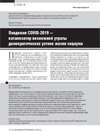COVID-2019 Pandemic — a Catalyst for the Possible Loss of the Democratic Foundations of Society
DOI: 10.33917/es-4.170.2020.30-41
The ongoing COVID-19 pandemic began quite unexpectedly for all countries of the world community, although WHO has repeatedly warned about its possibility. It turned out that spreading of infection in all countries of the world depends not only on the level of urbanization and population density per 1 km2, but on the capability to effectively mobilize the national health system and on the quality of medical services, on their accessibility to all sectors of society, on the ability of the states leaders to provide appropriate regulation of public life. The most effective tools in the world became self-isolation, remote work (distance working) and introduction of quarantine regimes. Continuance of such measures implies, on the one hand, developing technologies for monitoring and ensuring social contact between citizens, and on the other, tightening control over the citizens behavior, including in remote work mode. The article provides a comparative analysis of these control systems, including the “social credit” in China, and concludes that remote working and opportunities that modern tracking and person re-identification technologies provide can be used even after the 2020 pandemic.



